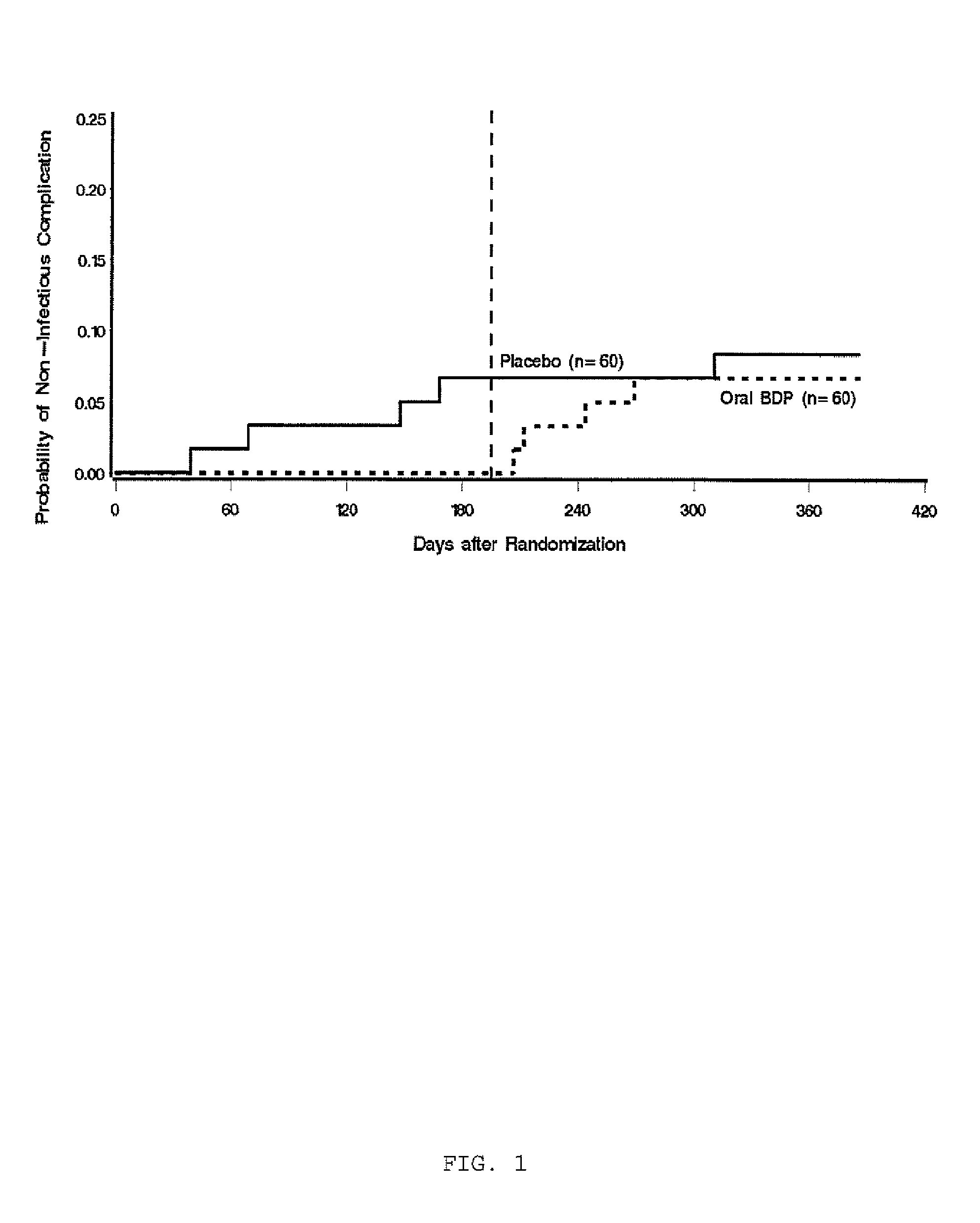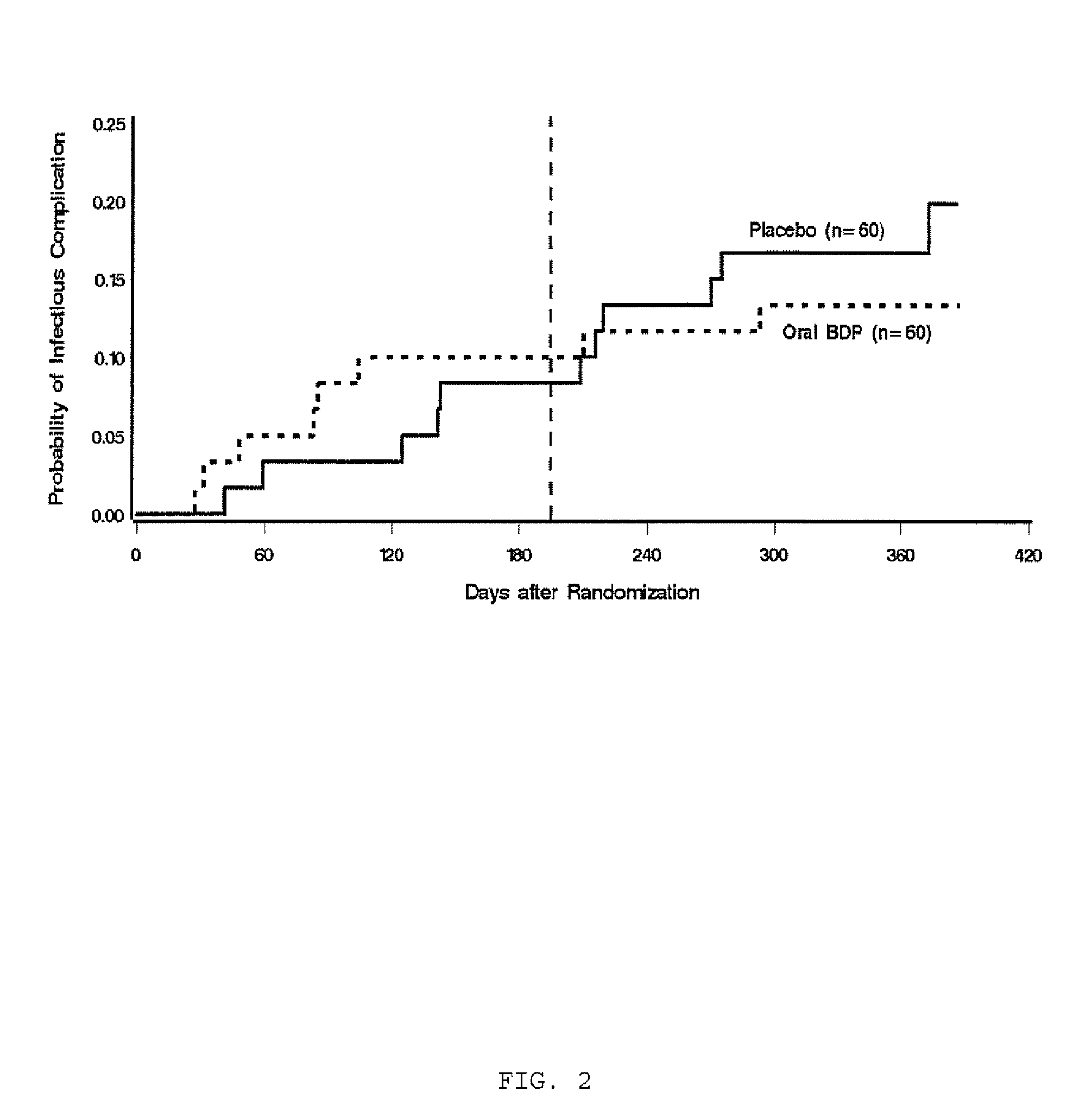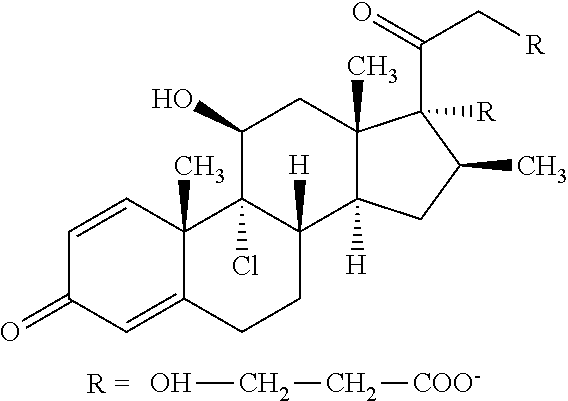Topically Active Steroids for Use in Interstitial Pulmonary Fibrosis
a technology of interstitial lung and fibrosis, which is applied in the direction of cardiovascular disorders, drug compositions, coatings, etc., can solve the problems of inability to predict the course of these diseases, the damage of lung tissue in some known or unknown way, and the inflamation of the walls of the air sac in the lung, so as to improve the delivery of medicaments to lung tissue, the effect of side effects and rapid clearance of such drugs
- Summary
- Abstract
- Description
- Claims
- Application Information
AI Technical Summary
Benefits of technology
Problems solved by technology
Method used
Image
Examples
example i
Preservation of Pulmonary Diffusing Capacity with Oral Beclomethasone Dipropionate
[0077]Patients with biopsy-proven acute gastrointestinal GVHD received an induction course of prednisone (1 mg / kg / day for 10 days) plus either oral BDP pills (8 mg / day in four divided doses, half as a gastric-release formulation and half as an enteric-coated formulation) or placebo. Patients whose symptoms were controlled at study day ten continued on study drug while the prednisone dose was rapidly tapered. Patients whose symptoms required additional prednisone were considered treatment failures. Study drug was discontinued on the day of treatment failure. The duration of treatment with study drug was 30 days with a 10-day follow-up period in the first trial and 50 days with a 30-day follow-up period in the second trial.
[0078]Pulmonary function assessments included forced vital capacity (FVC), one-second forced expiratory volume (FEV1), total lung capacity (TLC), and carbon m...
example ii
Categorization of Pulmonary Disease after Hematopoietic Cell Transplantation
[0084]While blinded to randomization assignment, investigators reviewed all patients' pulmonary radiologic records accumulated from the time of randomization to one year after transplantation. The medical records of all patients with abnormal pulmonary radiological findings were reviewed to determine whether the pulmonary disease was a clinically significant noninfectious or infectious syndrome. Clinically significant noninfectious pulmonary syndromes included idiopathic pneumonia syndrome (IPS), defined as widespread alveolar injury in the absence of active lower respiratory tract infection after HCT (Freudenberger T D et al., Blood, 2003; 102:3822-3828, diffuse alveolar hemorrhage (DAH), defined as IPS with bronchioalveolar lavage showing progressively bloodier return, or biopsy-proven cryptogenic organizing pneumonia (COP) otherwise known as bronchiolitis obliterans organizing pneumonia (BOOP). Clinically...
example iii
Measurement Of 17-Beclomethasone Monopropionate (17-BMP) in Blood from the Right Atrium
[0086]Four FHCRC patients enrolled in the Phase 3 randomized study had participated in a sub-analysis of BDP pharmacokinetics. At study Day 50, blood was drawn from the right atrium via an indwelling Hickman catheter at frequent intervals after a morning dose of oral BDP 2 mg (1 mg each in gastric-release and enteric-coated tablets). Blood samples were collected over EDTA, plasma was collected after centrifugation at 4° C., and aliquots were frozen at −20° C. until analysis for BDP and 17-BMP using high-pressure liquid chromatography and mass spectroscopy (MDS Pharma Services, Montreal, Canada). Pharmacokinetic parameters were calculated using WinNonlin v.2.1 (Pharsight Corp, Palo Alto Calif.). Plasma concentration-time data were plotted and non-compartmental parameters were calculated using the linear trapezoidal rule. Estimates for half-lives were obtained using regression analysis by specifying...
PUM
| Property | Measurement | Unit |
|---|---|---|
| median time | aaaaa | aaaaa |
| median time | aaaaa | aaaaa |
| disorders | aaaaa | aaaaa |
Abstract
Description
Claims
Application Information
 Login to View More
Login to View More - R&D
- Intellectual Property
- Life Sciences
- Materials
- Tech Scout
- Unparalleled Data Quality
- Higher Quality Content
- 60% Fewer Hallucinations
Browse by: Latest US Patents, China's latest patents, Technical Efficacy Thesaurus, Application Domain, Technology Topic, Popular Technical Reports.
© 2025 PatSnap. All rights reserved.Legal|Privacy policy|Modern Slavery Act Transparency Statement|Sitemap|About US| Contact US: help@patsnap.com



